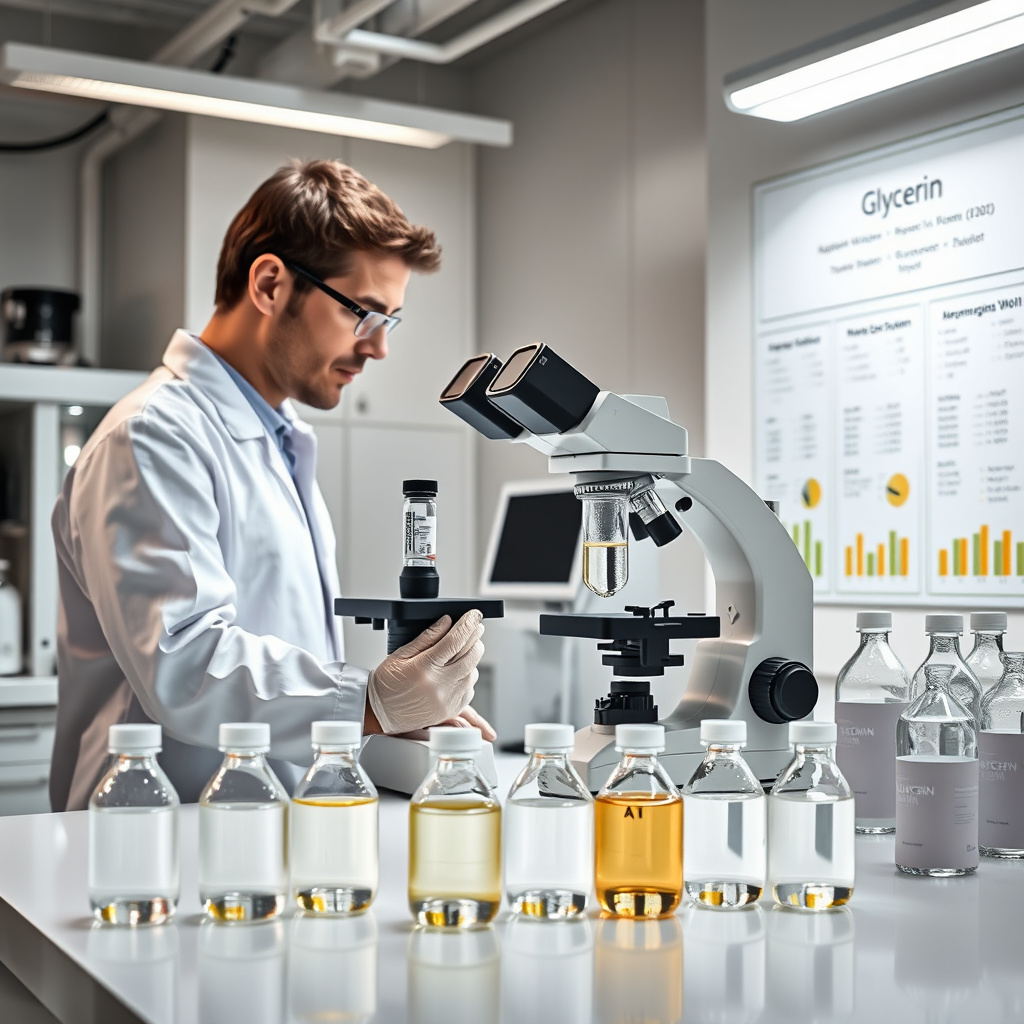How to choose quality glycerin for the food industry? This guide provides essential insights and criteria for selecting high-quality glycerin that meets industry standards.
How to choose glicerina de qualidade para a indústria alimentícia? This question is crucial for companies looking to ensure the safety and quality of their food products.
In this post, you will learn about the key factors to consider when selecting a reliable glycerin supplier.
From understanding glycerin’s applications in food to evaluating supplier certifications, we promise to equip you with the knowledge needed to make informed choices in your procurement process.
Understanding the Role of Glycerin in Food Production
Glycerin, also known as glycerol, is a versatile compound that plays a significant role in the Indústria Alimentícia. It is a colorless, odorless liquid that is sweet-tasting and non-toxic, making it a valuable ingredient in a variety of food products. At its core, glycerin serves multiple functions, from acting as a humectant to preserving moisture in food items, to functioning as a sweetener and thickening agent. This multifaceted nature of glycerin is what makes it essential in food production.
Why Glycerin is Important in Food Production
One of the primary reasons glycerin is used in the Indústria Alimentícia is its ability to retain moisture. This property helps extend the shelf life of products, ensuring that they remain fresh and appealing to consumers. Foods like baked goods, sauces, and dressings often incorporate glycerin to maintain their texture and flavor over time.
- Moisture Retention: Glycerin helps prevent drying out, ensuring that products stay soft and palatable.
- Sweetening Agent: It can enhance the sweetness of food without the calories associated with sugar, making it a popular choice for low-calorie products.
- Thickening Agent: Glycerin can improve the viscosity of liquids, which is particularly useful in sauces and syrups.
Choosing Quality Glycerin for Food Production
When sourcing glycerin, it is crucial to ensure that you are selecting a high-quality product. This is where the role of a reliable glycerin manufacturer or glycerin supplier becomes vital. Quality glycerin not only meets safety standards but also enhances the overall quality of food products. Companies specializing in glycerin sourcing often provide detailed information about their production processes, which can aid in making informed decisions.
In the current market, many businesses seek to buy glycerin online to ensure a steady supply. Whether you are looking for bulk glycerin supply or specific formulations for unique recipes, it’s essential to work with a reputable industrial glycerin supplier. This ensures that the glycerin meets industry standards and is suitable for food applications.
Applications of Glycerin in Different Food Products
Glycerin finds its way into various types of food products, including:
- Baked goods, where it helps maintain moisture and softness.
- Confections and candies, serving as a sweetener and humectant.
- Dressings and sauces, where it contributes to smooth textures.
- Frozen foods, enhancing the mouthfeel and preventing ice crystal formation.
As the demand for innovative food products continues to rise, the importance of understanding the role of glycerin in food production cannot be overstated. By partnering with trusted glycerin wholesale prices suppliers and ensuring the quality of the glycerin used, manufacturers can create superior products that meet consumer expectations.
Key Factors to Assess When Selecting a Glycerin Supplier
Choosing the right supplier for glycerin is crucial for businesses operating in the Indústria Alimentícia. Glycerin, a versatile ingredient, plays a significant role in enhancing product quality and safety. To ensure you make an informed decision, consider the following key factors when assessing potential glycerin suppliers.
Quality and Purity Standards
The first thing to verify is the quality and purity of the glycerin offered. It is essential to choose a supplier who adheres to strict quality standards and provides documentation of compliance with food safety regulations. Look for suppliers that offer glycerin derived from reputable sources, ensuring it meets the necessary criteria for use in food production.
Production Processes
Understanding the glycerin production process is vital. Suppliers who utilize advanced, safe, and environmentally friendly production methods are often more reliable. Research the manufacturer’s practices to confirm they align with your quality expectations. A transparent production process can indicate a commitment to quality and safety in their glycerin products.
Certifications and Compliance
Check for certifications that demonstrate a supplier’s commitment to quality and safety standards. Compliance with regulations from health and safety authorities is a must for any glycerin supplier. Certifications such as ISO or GMP can be strong indicators of a supplier’s reliability and adherence to industry standards.
Supplier Reputation and Experience
A supplier’s reputation in the market can offer valuable insights into their reliability and product quality. Look for reviews and testimonials from other clients in the Indústria Alimentícia to gauge their experiences. An experienced glycerin manufacturer often has the knowledge and resources to meet specific industry needs, making them a preferred choice.
Pricing and Availability
While cost should not be the sole factor in your decision, it is essential to consider pricing structures. Evaluate glycerin wholesale prices and compare them among different suppliers. Additionally, ensure that the supplier can meet your volume requirements consistently. A reliable supplier should have a robust supply chain, allowing you to buy glycerin online or access bulk glycerin supply without delays.
Customer Support and Communication
Effective communication is vital when establishing a partnership with a glycerin supplier. Good customer service can enhance your experience and ensure that any issues are addressed promptly. Assess how responsive the supplier is to inquiries and whether they provide support throughout the purchasing process. This relationship can be crucial when navigating any challenges that may arise.
Flexibility and Customization Options
In the current market, having a supplier who can offer flexibility and customization options can set you apart. If your products require specific glycerin formulations, opt for suppliers willing to accommodate your needs. This adaptability can enhance your product offerings in the Indústria Alimentícia.
By focusing on these key factors, you can make a well-rounded decision when selecting a glycerin supplier. Ensuring that your chosen partner aligns with your business values and quality expectations will ultimately contribute to your success in the highly competitive food production landscape.
Quality Assurance: What to Look for in Glycerin Products
When it comes to ensuring quality in glycerin products, especially for the Indústria Alimentícia, there are several key factors that should guide your selection process. Understanding these factors can help you make informed decisions when sourcing glycerin from suppliers, ultimately affecting the quality of your food products.
Purity and Composition
One of the most critical aspects to consider is the purity of the glycerin. High-quality glycerin should have a purity level of at least 99.7%. Check the product specifications provided by your glycerin supplier to ensure that the glycerin meets food-grade standards. Impurities can lead to adverse effects on both flavor and safety in food applications.
Source and Production Process
The source of the glycerin is equally important. Vegetable glycerin, derived from plant sources, is often preferred for food applications due to its natural origin. Make sure to inquire about the glycerin production process used by your supplier. Understanding whether they use sustainable practices can also enhance your product’s marketability.
Certifications and Compliance
Always look for certifications that demonstrate compliance with food safety standards. Certificates like ISO, FDA registration, or organic certifications can indicate that the glycerin has been produced under rigorous quality control measures. This not only ensures the quality of the glycerin but also builds trust between you and your glycerin manufacturer.
Testing and Quality Control
Inquire about the testing protocols used by your glycerin supplier. Regular testing for contaminants, such as heavy metals and microbial presence, is essential. A reputable supplier should provide documentation of these tests and any quality assurance measures they implement.
Transparency and Communication
Effective communication with your glycerin sourcing companies is vital. A reliable supplier should be transparent about their sourcing practices, production methods, and any potential issues that could affect product quality. This openness can foster a strong relationship and ensure that you receive the best possible glycerin for your needs.
Pricing and Availability
While quality should be your primary concern, pricing also plays a role in sourcing decisions. Compare glycerin wholesale prices among different suppliers to find a balance between cost and quality. Additionally, consider the supplier’s capacity for bulk glycerin supply to meet your production demands effectively.
Customer Reviews and Reputation
Finally, take the time to research customer reviews and the reputation of potential suppliers. Feedback from other businesses in the Indústria Alimentícia can provide valuable insights into the reliability and quality of the glycerin products offered. This can help you make a more informed choice when you decide to buy glycerin online or from local sources.
By prioritizing these quality assurance aspects, you can confidently choose glycerin products that meet the high standards required for successful food production.
Regulatory Compliance and Safety Standards for Food-Grade Glycerin
When diving into the intricacies of the Indústria Alimentícia, understanding the regulatory compliance and safety standards surrounding food-grade glycerin is essential. This substance, derived from both plant and animal fats, plays a vital role in various food applications, serving as a sweetener, humectant, and preservative. However, not all glycerin is created equal, and ensuring that the product meets stringent safety standards is paramount for any food manufacturer.
Understanding Regulatory Frameworks
In many regions, food-grade glycerin must comply with regulations set forth by organizations such as the Food and Drug Administration (FDA) and the European Food Safety Authority (EFSA). These regulatory bodies establish guidelines to ensure that any glycerin used in food products is safe for consumption. This includes strict limits on contaminants and a requirement for proper labeling, which aids in transparency for consumers.
Safety Standards for Food-Grade Glycerin
Safety standards encompass both the production process and the final product. Food-grade glycerin should undergo rigorous testing to confirm its purity and safety. Manufacturers must adhere to Good Manufacturing Practices (GMP), which ensure that the production environment is clean and the processes minimize contamination risks. This is crucial for maintaining the integrity of the product throughout its lifecycle.
Quality Testing and Certifications
- Quality assurance begins with sourcing glycerin from reputable suppliers. Look for certifications such as ISO, which indicate adherence to international quality standards.
- Regular testing for impurities and contaminants is also crucial. This may include assessment for heavy metals, residual solvents, and microbial content.
- Another important aspect is the traceability of the raw materials used in the production of glycerin. Knowing the origin helps ensure compliance with safety regulations.
Choosing a Reputable Glycerin Supplier
When considering where to buy glycerin online, it’s important to evaluate potential suppliers based on their adherence to these regulatory standards. A reliable glycerin supplier will provide documentation proving the safety and quality of their products. This includes test results, certifications, and a clear overview of their production processes. Engaging with suppliers who prioritize compliance not only ensures the safety of your products but also aligns with consumer expectations for quality.
In the current landscape, where consumers are increasingly health-conscious, maintaining high standards of safety and compliance in the production of food-grade glycerin is non-negotiable. By focusing on reputable manufacturers who prioritize regulatory compliance, businesses in the Indústria Alimentícia can not only meet industry standards but also foster trust and loyalty among their customers.
Sustainability in Glycerin Production: Why It Matters
Understanding the Impact of Glycerin Production
In today’s world, where environmental concerns are at the forefront, the sustainability of glycerin production has gained significant attention. As industries strive to minimize their ecological footprint, the methods used to produce glycerin play a crucial role. This compound, widely utilized in the Indústria Alimentícia and beyond, can be sourced through various processes, some of which are more sustainable than others. Understanding these processes can help consumers and businesses make informed decisions when selecting glycerin suppliers.
Eco-Friendly Sourcing Practices
One of the most significant factors in sustainable glycerin production is the raw material used. Traditional glycerin is often derived from fossil fuels, which raises concerns about carbon emissions and resource depletion. However, many manufacturers are now turning to renewable sources, such as vegetable oils and fats. This shift not only reduces the environmental impact but also supports agricultural practices that can be more sustainable in the long run. When you choose to buy glycerin online or from a local glycerin supplier, it’s essential to inquire about their sourcing practices.
- Are they using sustainably sourced materials?
- Do they have certifications that validate their eco-friendly claims?
Reducing Waste in Production
Another aspect of sustainability in glycerin production is waste management. Innovative glycerin manufacturers are increasingly adopting practices that minimize waste during the production process. By implementing advanced technologies and recycling techniques, these manufacturers can create a more efficient production cycle. This not only conserves resources but also reduces the overall impact on the environment. When assessing potential glycerin sourcing companies, consider their commitment to waste reduction and efficiency.
Transparency and Ethical Practices
Transparency is vital in the quest for sustainable glycerin. Consumers are becoming more conscious of where their products come from and how they are made. Therefore, choosing a glycerin supplier that openly shares information about their production processes, sourcing, and sustainability initiatives is crucial. Look for suppliers who are willing to provide details about their environmental policies and social responsibility efforts. This transparency can help build trust and ensure that your choice aligns with your values.
The Role of Regulatory Compliance
In the Indústria Alimentícia, adhering to regulatory standards is paramount. Sustainable glycerin production should not only focus on environmental impact but also on safety and compliance with health regulations. Suppliers who prioritize these aspects demonstrate a commitment to quality and responsibility. By selecting suppliers that meet or exceed regulatory requirements, businesses can ensure that the glycerin they use is safe for consumption and produced ethically.
Future Directions in Glycerin Production
Looking ahead, the trend toward sustainability in glycerin production is expected to grow. As consumer demand for eco-friendly products increases, the industry is likely to see more innovations in production methods and sourcing practices. Companies that adapt to these trends will not only contribute positively to the environment but also cater to a market that values sustainability. By choosing sustainable glycerin, you are not just making a purchase; you are contributing to a larger movement towards a more responsible and eco-conscious future in the Indústria Alimentícia.
Making the Final Decision: Comparing Glycerin Suppliers
Assessing Supplier Options
Choosing the right glycerin supplier is crucial for any business in the Indústria Alimentícia. With various options available, it can be overwhelming to make a final decision. Start by compiling a list of potential suppliers. Look for glycerin sourcing companies that have established reputations and positive feedback from their clients. Customer reviews, testimonials, and industry recommendations can provide insight into the reliability and quality of their products.
Evaluating Product Quality
Once you have a shortlist, focus on evaluating the quality of the glycerin they offer. Ask for samples to conduct your own tests or inquire about the supplier’s quality assurance processes. A reputable glycerin manufacturer should provide detailed information about their production methods and any certifications they hold. Look for suppliers who emphasize the importance of quality in the glycerin production process, as this will directly impact your products.
Pricing Considerations
Pricing is another essential factor in your decision-making process. While you want to ensure you’re getting the best product, it’s also important to consider your budget. Compare bulk glycerin supply prices from different suppliers to find competitive rates. Be wary of prices that seem too low; they may indicate lower quality glycerin, which could affect your final product in the Indústria Alimentícia.
Logistics and Supply Chain Reliability
In addition to quality and pricing, think about the logistics involved with each supplier. Consider their ability to deliver glycerin consistently and on time. A good supplier should have a clear and efficient shipping process, especially if you are looking to buy glycerin online or need a reliable industrial glycerin supplier for your production needs. Assess their capacity to handle your orders, especially during peak seasons.
Customer Support and Communication
Effective communication is vital when establishing a partnership with a glycerin supplier. Evaluate how responsive they are to inquiries and how willing they are to provide additional information. A supplier who values customer support can make your experience smoother, especially if any issues arise during the ordering or delivery processes. Establishing a good rapport with your supplier can lead to a long-lasting business relationship.
Sustainability Practices
Lastly, consider the sustainability practices of your potential suppliers. In today’s market, many companies are increasingly focused on producing glycerin in environmentally friendly ways. If sustainability matters to your brand or your customers, inquire about the supplier’s practices regarding sourcing and production. This aspect not only aligns with current consumer trends but also contributes to a positive brand image in the Indústria Alimentícia.
As you evaluate all these factors, you’ll be better equipped to make an informed decision on which glycerin supplier aligns best with your business goals and values. Balancing quality, price, reliability, and sustainability will ultimately guide you to the right partner for your glycerin needs.






